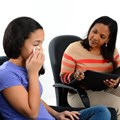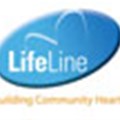The holiday season is often described as "the most wonderful time of the year", but for many, it can be a very difficult time.
The movies and popular advertising portray the holidays as full of cheer, but often many struggle to cope with grief, stress, end-of-year burnout, financial strain, family problems and loneliness.
Whether you have a large family surrounding you or no one to spend the holidays with this year, the feeling of being alone can effect us no matter.
Add to this, the grief we're all experiencing within the context of the Covid-19 pandemic, as family members see in their first New Year 'celebrations' without loved ones they've lost, and we have a complex recipe of stressors. This can make it even more difficult for people who've experienced losses or who are living with a mental-health issue.
The many faces of grief
The Centers for Disease Control and Prevention explains that grief is a normal response to loss during or after a disaster or other traumatic event. "Grief can happen in response to loss of life, as well as to drastic changes to daily routines and ways of life that usually bring us comfort and a feeling of stability. Common grief reactions include: shock, disbelief, or denial; anxiety; distress; anger; periods of sadness; loss of sleep and loss of appetite.
"Some people may experience multiple losses during a disaster or large-scale emergency event. Because of the Covid-19 pandemic, you might be unable to be with a loved one when they die, or unable to mourn someone’s death in-person with friends and family.
"Other types of loss include unemployment, or not making enough money, loss or reduction in support services, and other changes in your lifestyle. These losses can happen at the same time, which can complicate or prolong grief and delay a person’s ability to adapt, heal, and recover."
Add to this, that New Year celebrations involve an expectation of being highly sociable - when all you're feeling is the need to cocoon - and one can feel burdened by the expectation to see lots of people, and to indulge in expensive or lavish celebrations.
You are not alone
The most important thing to know if you're struggling with complex emotions within the backdrop of "the festive" season, is that there are resources available to support you emotionally.
Secondly, while you may feel lonely, you're not alone in your experience. One just needs to look at how the number of SADAG's support groups have grown to truly appreciate this.
From having a total of zero online support groups in January of 2020, The South African Depression and Anxiety Group (SADAG) now has more than 35 online nationwide groups around the country. It has hosted over 15 guest speakers in the last year, enjoyed over 40 support-group leader Connect sessions, and launched its first annual Support Group Awareness Week.
From January to September 2021, the 24-hour Department of Social Development Substance Abuse helpline received over 110 000 calls, SMS’s, online chats and Contact-a-Counsellor forms from across various parts of the country.
A helping hand
People cope with losses in different ways. If you need help dealing with your loss, resources are available for support and help. If you need to speak to someone immediately, please contact a counsellor on 0800 21 22 23 or 0800 70 80 90 or SMS 31393 and a counsellor will call you back to help further. You can then decide if you'd like to join a SADAG support group.
Kreshnee Govender 2 Nov 2021 Here is a list of free telephone counselling hotlines:
* Adcock Ingram Depression and Anxiety Helpline
0800 70 80 90
* ADHD Helpline
0800 55 44 33
* Akeso Psychiatric Hospitals 24-Hour Emergency Response Unit
0861 435 787
* Cipla 24hr Mental Health Helpline
0800 456 789
* Cipla Whatsapp Chat Line
(9am-4pm, 7 days a week)
076 882 2775
* Destiny Helpline For Youth & Students
0800 41 42 43
* Dr Reddy's Help Line
0800 21 22 23
* Healthcare Workers Care Network Helpline
0800 21 21 21 (24hr)
SMS 43001
* Lifeline
Counselling Line: 021 461 1111
063 709 2620 (WhatsApp)
* NPOWERSA Helpline
0800 515 515
SMS 43010
* Pharmadynamics Police & Trauma Line
0800 20 50 26
* SADAG Mental Health Line
011 234 4837
* SADAG Suicide Crisis Line
0800 567 567
SMS 31393
* Substance Abuse Helpline
0800 12 13 14 (to speak to a counsellor)
SMS 32312 (and a counsellor will call you back)
The 24-hour Department of Social Development Substance Abuse helpline provides free telephonic counselling, support, information and nationwide referrals such as rehabilitation centres, addiction specialists, support groups, brochures, and self-help tips and videos to assist those struggling with addiction or loved ones needing support.
The project has also continued to support many external collaborators and stakeholders with materials for their various projects and activities ensuring information around the helpline is shared for continuous exposure.
The right to be heard
Everyone has a right to be heard, everyone deserves to give voice to difficult emotions and to know they are not alone in their experiences. Thanks to the amazing counsellors working for our country's many tele-counselling hotlines, this is possible due to their generosity of time and service.
As LifeLine Western Cape attests: "Our role is to create a safe space for people to share what is happening in their lives. We believe that it is every person’s right to be treated with dignity and respect. We listen to the call of those who turn to us for comfort and support. We offer non-judgemental, empathic, caring and non-directive counselling services. We are here to help callers and clients discover previously unknown inner resources with which to find constructive solutions to the problems they face."
All it takes, if you're going through a tough time, is the courage to take that first step: to ask for help.




































